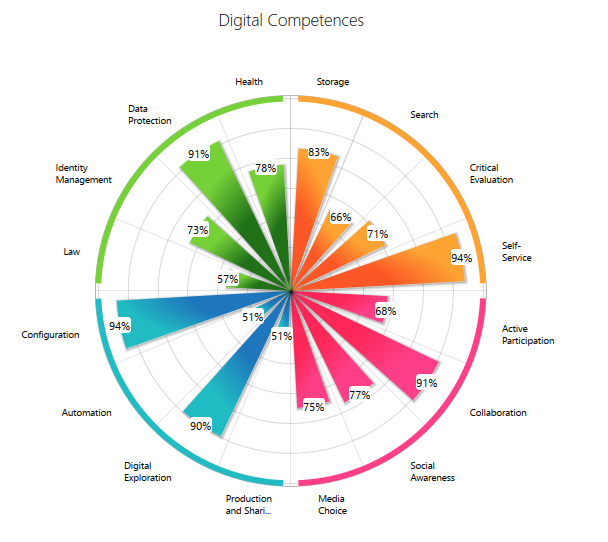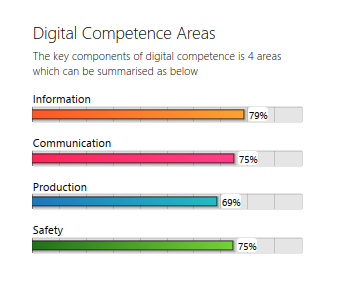Digi Citizen
In this blog post I’m commenting on living as a digital citizen in modern society. Digital services and digitalization cannot be avoided, since every aspect of our lives is intertwined with the digital world. We use applications and services everyday at work, social media and messaging applications to communicate with friends and colleagues, order food online, do our banking and bookkeeping, store passwords and tens of other activities online.
In private life we have to also use, or are entitled to use, public services in digital format for example health records (OmaKanta), the social Insurance institution of Finland (KELA), pension funds, tax records. I tend to always use digitalized versions if that is possible.
At this point of my life Kela’s services don’t play crucial part. That said I am getting compensation for medications and I have to pay student healthcare fee while studying in university of applied sciences. I have the European healthcare card, have had it for many years. Haven’t had the need to use it, thankfully.
Health record system OmaKanta I use regularly and I also use “Maisa” information portal, which is used in Uudenmaa region in south Finland. Signing in for these services has been made easy as possible, you can use banking credentials or mobile certificate to identify yourself. I consider these services safe and trustworthy.
Because I work in a private sector my pension fund is maintained in Varma insurance company. This was the first time that I took time to go through coming pension funds and I was a little shocked. Hopefully the balance will add up while I continue to work until I’m 70 (laughing).
When it comes to comparing international digital shops with Finnish local shops in terms of prices and reliability, there are several factors to consider.
Prices:
International digital shops typically have a wider selection of products available, often at lower prices due to economies of scale and the ability to source products from multiple suppliers. However, shipping costs and import taxes may increase the final cost of the product.
Finnish local shops, on the other hand, may have higher prices due to the smaller market and higher operating costs. However, they often offer personalized service and the ability to physically see and touch the product before making a purchase.
Reliability:
International digital shops may have a mixed reputation for reliability. While some well-known online retailers have established a reputation for secure transactions and reliable shipping, there are also many less well-known websites that may not be as trustworthy. It can be difficult to know which sites to trust and which to avoid.
Finnish local shops, on the other hand, have a reputation for reliability and trustworthiness. They are subject to local laws and regulations, and customers have the ability to visit the store and speak to staff if they have any issues.
Overall, the choice between international digital shops and Finnish local shops comes down to personal preference and priorities. Those looking for a wider selection of products at lower prices may prefer international digital shops, while those looking for personalized service and reliability may prefer Finnish local shops. It’s important to do your research and choose a reputable retailer, regardless of whether it is a local or international shop.
Domacare is an enterprise resource planning system (ERP) which is mainly designed for social and healthcare setting in private sector. I use this program on daily basis to plan shifts for employees, handle billing, use it as a social care customer system. This program has interfaces to connect its information to different systems for example billing and HR systems.
Program is quite comprehensive and it offers all the functionality needed in one program. Learning curve for this program will take time but in the end is quite reliable and gets the job done. There aren’t so much competition in this sector for software programs and that is something that I would like to see change.
Digitalization has brought significant benefits and opportunities for individuals, businesses, and society as a whole. However, it has also created a digital divide, or digital gap, between those who have access to and use virtual services and those who do not. The risks and challenges for people who do not use virtual services are significant and can have far-reaching consequences.
- Social Exclusion: As more services move online, people who are not comfortable or familiar with technology can become increasingly isolated. They may struggle to connect with friends and family who use virtual platforms to stay in touch, which can lead to feelings of loneliness and social exclusion.
- Limited Access to Information: The internet is a vast source of information, but people who do not use virtual services may struggle to access critical information that could improve their quality of life. They may miss out on news updates, and even emergency information.
- Reduced Productivity: Many companies now use digital tools to communicate, collaborate, and manage their work. People who do not use virtual services may find it challenging to keep up with their colleagues and may struggle to work as efficiently as their digital-savvy peers.
- Reduced Access to Healthcare: The COVID-19 pandemic has highlighted the importance of virtual healthcare services, such as telemedicine. People who do not use virtual services may struggle to access healthcare services or receive delayed treatment, putting their health at risk.
The risks and challenges for people who do not use virtual services are significant, and they can impact various aspects of life. It is essential to work towards reducing the digital gap to ensure that everyone has equal access to the opportunities provided by digital services digitalization.
Digital Competencies test was very interesting. It was the first test that I’ve done to these particular competencies. It showed what I’ve kind of already knew. My strengths are in the digital safety, using different kind of operating systems and software and open mind to test new programs. Areas where I need practice are content creation and media editing. Overall score was advanced. There’s always new things to learn.


Self evaluation
This assignment helped me to deepen my understanding of digital world and how it impacts our lives. It made me realize how much we use, and rely on, digital services in our personal and work life. The constant need to educate yourself on new things is a must in modern society. It also helped me to understand that as “tech savvy” person I need to help my friends, family and colleagues more on digital services and everyday digital challenges, home and work settings.
Blogs I’ve commented on
1 Comment
Petra Koskinen · 11/04/2023 at 11:53
Hi! As you wrote Finnish shops are seen as reliable sites. I feel so too. I’v been ordering stuff from foreign (reliable) websites, but it still feels more safe to shop from my home country.
It’s sad that Domacare takes time to learn how to use it. I think that digitalisation is a good thing, but digital tools should be more user friendly.